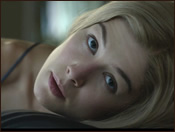Review: “Gone Girl” starring Ben Affleck and Rosamund Pike
 Some films are meant to be taken at face value: a car chase is a car chase, an explosion is an explosion, and they are there solely to get the adrenalin pumping and to attract the eye. Other films are purposefully deeper: for example, the German film, “The Lives of Others” is designed to stimulate both thought and emotion. It’s a rare film that can be taken both at face value yet offers a great deal to consider. “Gone Girl”, starring Ben Affleck and Rosamund Pike, based upon the best selling novel by Gillian Flynn, is of this extraordinary type.
Some films are meant to be taken at face value: a car chase is a car chase, an explosion is an explosion, and they are there solely to get the adrenalin pumping and to attract the eye. Other films are purposefully deeper: for example, the German film, “The Lives of Others” is designed to stimulate both thought and emotion. It’s a rare film that can be taken both at face value yet offers a great deal to consider. “Gone Girl”, starring Ben Affleck and Rosamund Pike, based upon the best selling novel by Gillian Flynn, is of this extraordinary type.
“Gone Girl” tells the tale of a seemingly idyllic couple whose marriage takes a dark turn. Midnight crashes in at the moment the film starts: we see Pike’s porcelain complexioned, almost too symmetrical face and her fathomless eyes look up. We then hear Affleck’s voice narrate his response to her gaze: he wonders what she is thinking, and muses if he could obtain this information by cracking open her skull.
As this opening indicates, Affleck’s character, a failed writer from Missouri named Nick Dunne, is not a sympathetic one. He is self-indulgent and self-pitying. This may be Affleck’s best role to date: his air of scruffy bewilderment, which has followed him through his other roles, has perhaps found its ultimate expression.
His wife, Amy (Rosamund Pike), is also not pleasant; the audience’s antipathy towards her is built up throughout the course of the film. At first, she seems to be almost a cardboard cutout of what a modern, trendy American woman is supposed to be: she is shown as always well turned out, never exceeds a size 2, is well educated, has a career (though it is not of sufficient consequence to intrude on the film’s narrative), and even accedes to misogynistic male fantasy. She is shown as being consistently sexually available and adventurous.
At first, Nick and Amy’s love story is literally saccharine: they share their first kiss outside a bakery, which in the process of loading its wares onto a waiting van, has blown up a storm of sugar. A powerful image: Nick gently touches the sugar that has accumulated on Amy’s lips before embracing her.
 Thankfully, the film scratches this altogether too pristine surface and shows the pathology which lies underneath. For example, we are introduced to Amy’s parents (played by Lisa Banes and David Clennon), who are brazenly neurotic: they have authored a series of children’s books about Amy’s life, entitled “Amazing Amy”, and every volume they’ve produced is an improvement on the daughter they actually have. The fictional Amy is a virtuoso at the cello, while the “real” Amy gave up the instrument long ago. The fictional Amy played varsity volleyball, while her “real” counterpart did not excel.
Thankfully, the film scratches this altogether too pristine surface and shows the pathology which lies underneath. For example, we are introduced to Amy’s parents (played by Lisa Banes and David Clennon), who are brazenly neurotic: they have authored a series of children’s books about Amy’s life, entitled “Amazing Amy”, and every volume they’ve produced is an improvement on the daughter they actually have. The fictional Amy is a virtuoso at the cello, while the “real” Amy gave up the instrument long ago. The fictional Amy played varsity volleyball, while her “real” counterpart did not excel.
Furthermore, Nick and Amy’s marriage is tested by recession: both of them lose their jobs. Then Nick’s mother is diagnosed as having cancer, and as a consequence they then move from New York to the small Missouri town from whence Nick came. The “Missouri Nick” is shown to be more dissolute than the New York variant. Then, Amy disappears.
What follows could be taken at face value: a gripping thriller, a murder mystery, a complex plot laid by a psychotic criminal. But if one takes a moment to step outside the dramatic pressure of the narrative, it’s easy to see the film has many interesting things to say.
It says great deal about America’s media culture, its relentless drumbeat which most strongly echoes on cable television news, and how it can so easily dictate the public’s perception of events. If Nick is caught in an awkward selfie taken by an admirer, his forced smile is read by a commentator as a sign of complicity in his wife’s disappearance. His close relationship to his sister Margo (played by Carrie Coon) is interpreted by the same commentator as a sign of even greater depravity, i.e., incest. Having said that, the only kind of love that is shown in this film to be pure and unconditional is that between brother and sister: this is very rarely seen in modern cinema.
The film says a great deal about misogyny: Amy is the “Madonna-Whore complex” made flesh. Yet, she is privately, murderously scornful of men and how they classify women into categories such as “the cool girl”.
The movie expounds at length about the state of the American dream: couples have to look perfect, live in perfect homes, and have stories that can be read in popular tabloids or portrayed on television. This is a complete and utter sham: yet the public is also shown not to be sufficiently intelligent to perceive this. Rather, they consistently lap up fictions which inspire them to scorn, pity or envy.
Overall, however, this film may be mainly about lies: the lies that we tell ourselves, the lies that exist between people who are supposed to be honest with each other, the lies we present to the outside world because we fear that being authentic is also a recipe for ostracism. Because Amy and Nick are both liars, albeit of different types and depravity, they may be an apropos match for each other: in this sense, perhaps the film can be labelled a love story, albeit a very distorted one.
If the film has a particular weak point, it is its portrayal of law enforcement: the lead detective (as played by Kim Dickens) does question why the clues so neatly stack up and muses that everything is just a little too perfect. However, this moment of reflection doesn’t cause her to flinch from being absolutely certain of Nick’s guilt later on. Towards the end of the film, the FBI are portrayed as being as gullible and indeed, stupid.
Nevertheless, this lapse in the narrative is easily forgotten thanks to Rosamund Pike’s extraordinary performance as Amy: it is by no means a simple matter to portray someone as psychologically distorted as Amy without becoming a cinematic cliché (e.g. a “bunny boiler”). Somehow, she pulls it off, and does so with a pristine American accent (Pike is English).
It seems altogether proper that the film did not have a happy ending; it would have been very strange if justice prevailed in this twisted environment. In the theatre in which I saw this film, after the credits rolled and the lights went up, there were a few male voices that let fly with “psycho” and “bitch”. It was clear that they bought into the surface narrative, and had quickly scuttled back to misogyny. It is entirely possible to treat it as just a thriller, perhaps even a successor to Hitchcock’s works, and to rise and fall as moments are spattered with profuse quantities of blood. But films like “Gone Girl” hold up a mirror to our culture. Perhaps those who retreated to the surface narrative merely didn’t care for the ugliness they perceived; a pity, a true appreciation for this film may only arise from understanding its whole message .


